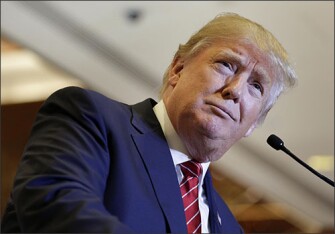
The 2016 presidential election’s heated rhetoric and divisive policy proposals have had a negative effect on school climate, causing some students to feel unwelcome, unsafe, or singled out by their peers, says a new report by an advocacy organization.
Teaching Tolerance, the branch of the Southern Poverty Law Center that released the report this week, calls it the “Trump effect.”
The report’s findings, based on a non-scientific survey, may be skewed by the nature of its respondents. About 2,000 K-12 teachers responded to the survey, after visiting the Teaching Tolerance website or being referred by its mailing list, which suggests they may have a higher level of sensitivity or interest in issues related to racial and cultural sensitivity.
The survey didn’t mention specific candidates, but respondents overwhelmingly singled out billionaire businessman and Republican frontrunner Donald J. Trump as the most problematic.
Among the survey’s findings:
- More than two-thirds of the teachers reported that students—mainly immigrants, children of immigrants and Muslims—have expressed concerns or fears about what might happen to them or their families after the election.
- More than half have seen an increase in uncivil political discourse.
- More than one-third have observed an increase in anti-Muslim or anti-immigrant sentiment.
- More than 40 percent are hesitant to teach about the election.
The report comes months after the U.S. Department of Education urged schools to be mindful of how discussions surrounding terrorism attacks and political campaigns may be affecting students from ethnic and religious minority groups, immigrant students, and refugees in their schools. The obligation to respond to bullying and harassment is especially important “at this time when fear and anger are heightened, and when public debate sometimes results in the dissemination of misinformation,” said a letter to educators signed by the department’s former secretary, Arne Duncan, and its current secretary, John B. King Jr.
Some students “have been emboldened by the divisive, often juvenile rhetoric in the campaign,” the Teaching Tolerance report says. “Teachers have noted an increase in bullying, harassment and intimidation of students whose races, religions or nationalities have been the verbal targets of candidates on the campaign trail.”
Recently, students in one Indiana school chanted “build a wall!” at a basketball to taunt the opposing team, which was made up of mostly Latino students.
Teachers who responded to the survey said young students have asked, “Has the wall been built yet?” and that the mention of some campaign subjects can derail class discussions.
What do you think? Have schools and students experienced this campaign differently than past presidential campaigns?
Photo: Republican presidential candidate Donald Trump in September 2015. --Julie Jacobson/AP
Related:
